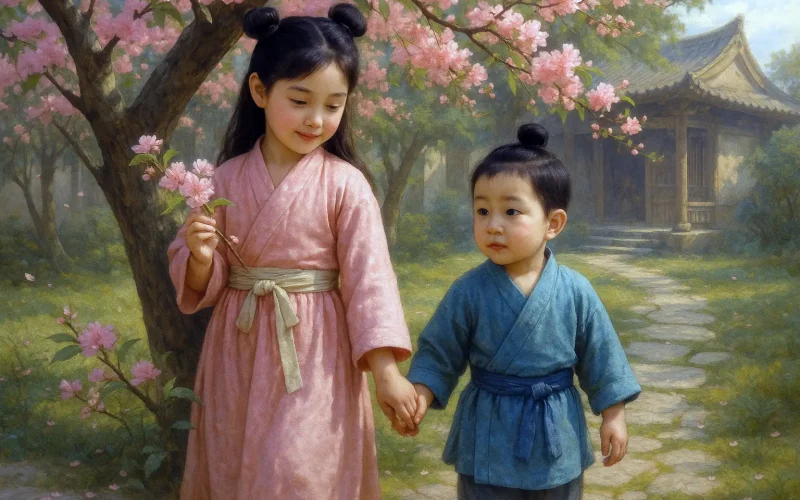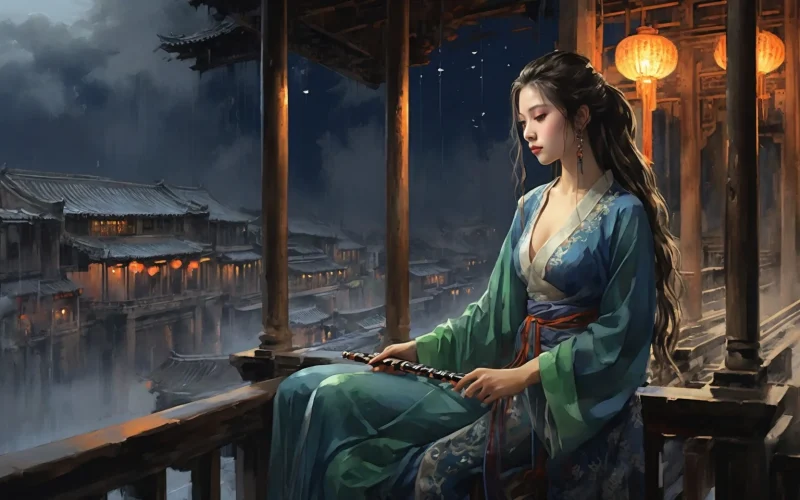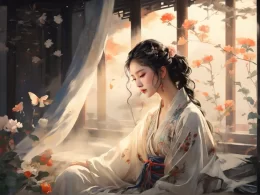Mulberry leaves in Southern land are green;
The silkworms thrice in sleep must have been.
In Eastern Lu my family stays still.
Who'd help to sow our fields north of Lu Hill?
It's now too late to do farm work of spring.
What then am I to do while traveling?
The southern wind is blowing without stop;
My heart flies back to my old familiar wine-shop.
East of the shop there's a peach tree oft missed;
Its branches must be waving in bluish mist.
It is the tree I planted three years ago;
If it has grown to reach the eaves, I don't know.
I have not been at home for three long years;
I can imagine my daughter appears
Beside the tree and plucks a flower pink,
Without seeing me, she must have, I think,
Shed copious tears.
My younger son has grown
Up to his sister's shoulders.
Beneath full-blown
Peach tree they stand side by side.
But who's there
To pat them on the back?
I feel, whene'er
I think of this, so painful that I write
And send to them this poem on silk white.
Original Poem
「寄东鲁二稚子」
李白
吴地桑叶绿,吴蚕已三眠。
我家寄东鲁,谁种龟阴田?
春事已不及,江行复茫然。
南风吹归心,飞堕酒楼前。
楼东一株桃,枝叶拂青烟。
此树我所种,别来向三年。
桃今与楼齐,我行尚未旋。
娇女字平阳,折花倚桃边。
折花不见我,泪下如流泉。
小儿名伯禽,与姊亦齐肩。
双行桃树下,抚背复谁怜?
念此失次第,肝肠日忧煎。
裂素写远意,因之汶阳川。
Interpretation
This poem, a renowned work by the great Tang poet Li Bai, was composed in 744 CE. At that time, having been ostracized by powerful court officials—particularly Li Linfu—Li Bai was compelled to leave Chang'an and journey to Jinling. This period, during the late reign of Emperor Xuanzong, was marked by political instability. As Li Bai drifted through these years of separation, his mood grew increasingly melancholic; his poetry reveals deep longing for his hometown, family, and children. This piece is a heartfelt expression of his solitude and sorrow during this wandering life.
During this time in Jinling, unable to resume his official career, Li Bai immersed himself in nostalgia for his homeland. His poems from this phase not only reflect concern for the state's political situation but also, through delicate lyricism, reveal his inner loneliness and pain. As one of the most talented poets of the Tang, Li Bai's works combine a heroic spirit with profound emotional depth. "To My Two Young Children in East Lu" is a genuine outpouring of emotion after leaving Chang'an, as he faced increasing distance from his hometown and family. Through depictions of the Jiangnan spring scenery, Li Bai projects his homesickness onto this warm native land; though a thousand miles away, his longing for home and loved ones—especially his children—never fades.
First Couplet: "吴地桑叶绿,吴蚕已三眠。"
Wú dì sāng yè lǜ, wú cán yǐ sān mián.
In the Wu lands, mulberry leaves turn green; Silkworms have already molted thrice.
Li Bai begins with vivid natural imagery, carefully sketching the spring scenery of Jiangnan. The lush green mulberry leaves and the silkworms' third molting are markers of the agricultural calendar, hinting at the region's fertility and the passage of seasons. Through these details, the poet evokes deep nostalgia for hometown life. This is not only a praise of Wu's scenery but also a profound attachment to home. The silkworms symbolize "vitality" and "the passage of time"; Li Bai's mood is clearly full of sorrow, struggling with the reality of growing distance from home.
Second Couplet: "我家寄东鲁,谁种龟阴田?"
Wǒ jiā jì dōng lǔ, shuí zhǒng guī yīn tián?
My home lies far in East Lu; Who now tends the fields beneath Turtle Mountain?
In this line, Li Bai uses a question to express worry and concern for his hometown's fields. "East Lu" refers to Li Bai's homeland, and "the fields beneath Turtle Mountain" are farmlands near Turtle Hill. Through this query, the poet reveals anxiety about his abandoned hometown, fearing the fields lie untended and even doubting his own growing separation from home. This question highlights his inner unease and solitude, as well as his yearning for the vitality of his homeland.
Third Couplet: "春事已不及,江行复茫然。"
Chūn shì yǐ bù jí, jiāng xíng fù mángrán.
Spring ploughing time is already missed; My river journey remains aimless.
This couplet expresses the poet's inner melancholy and confusion. Li Bai regrets missing the optimal time for spring ploughing at home, while his wandering journey still lacks direction. "Spring ploughing time is already missed" emphasizes the helplessness of losing connection with home, conveying anxiety over time's passage—as if all seasons and years are slipping away from him. "My river journey remains aimless" reflects his ongoing journey without a clear destination, portraying a life of solitude and uncertainty.
Fourth Couplet: "南风吹归心,飞堕酒楼前。"
Nán fēng chuī guī xīn, fēi duò jiǔ lóu qián.
The south wind blows my heart homeward, It flies and falls before the tavern.
The south wind, a warm monsoon, symbolizes the poet's deep homesickness. Personifying his yearning heart, Li Bai describes it as blown homeward by the south wind, as if returning to the tavern of his memories. This imaginative approach creates a poetic atmosphere—his heart races homeward, yet the wish remains unfulfilled, rendering the emotion more delicate and poignant.
Fifth Couplet: "楼东一株桃,枝叶拂青烟。"
Lóu dōng yī zhū táo, zhī yè fú qīng yān.
East of the tavern, a peach tree I planted, Its branches caress the misty haze.
Here, the peach tree becomes a link between Li Bai and his hometown. Planted by the poet himself, it represents the deep bond with his home and children. Li Bai intricately describes the tree's growth, as if it witnesses the passing years away from home. "Its branches caress the misty haze" paints a warm, vibrant image of home through delicate description, while the tree also evokes tender memories of past times.
Sixth Couplet: "此树我所种,别来向三年。"
Cǐ shù wǒ suǒ zhǒng, bié lái xiàng sān nián.
This tree was planted by my own hand; Three years have passed since I left.
Through this line, Li Bai expresses that three years have passed without returning home, intensifying his longing for hometown and children. The peach tree's growth symbolizes time's flow; three years of separation deepen the poet's sense of distance from home.
Seventh Couplet: "桃今与楼齐,我行尚未旋。"
Táo jīn yǔ lóu qí, wǒ xíng shàng wèi xuán.
Now the peach tree stands tall as the tavern, Yet I still wander, not returned.
This couplet contrasts time's passage with the poet's wandering. The peach tree has grown as tall as the tavern, yet Li Bai remains unable to return, leaving a poignant sense of regret. This detail reflects his inner helplessness and pain of rootlessness.
Eighth Couplet: "娇女字平阳,折花倚桃边。"
Jiāo nǚ zì Píngyáng, zhé huā yǐ táo biān.
My darling daughter, named Pingyang, Picks flowers by the peach tree.
This line tenderly captures the youthful innocence of his little daughter Pingyang, portraying her closeness to the peach tree and evoking a warm family scene. Through this depiction, Li Bai conveys a profound longing for his family, especially Pingyang's carefree innocence tinged with dependence on her father—a pain that strikes deepest.
Ninth Couplet: "折花不见我,泪下如流泉。"
Zhé huā bù jiàn wǒ, lèi xià rú liú quán.
Picking flowers, not seeing me, Her tears fall like a flowing spring.
This shows Pingyang's longing for her father, weeping in his absence. The poet uses his daughter's tears to convey the deep bond between father and children, while also revealing the sadness and regret of separation. The vivid metaphor "tears fall like a flowing spring" makes the emotion palpable and relatable.
Tenth Couplet: "小儿名伯禽,与姊亦齐肩。"
Xiǎo ér míng Bóqín, yǔ zǐ yì qí jiān.
My young son, named Boqin, Stands shoulder to shoulder with his sister.
This depiction of the son's growth conveys the passage of time and the father's regret at missing his children's upbringing. The change in the children's height hints at time's swift flow; the father can only perceive this transformation from afar, unable to partake in these precious moments.
Eleventh Couplet: "双行桃树下,抚背复谁怜?"
Shuāng xíng táo shù xià, fǔ bèi fù shuí lián?
Together they walk beneath the peach tree— Who now comforts them with a pat on the back?
Through the image of his children walking together, the poet expresses deep concern for their growth, while also revealing his own powerlessness and guilt as a father. This way, he conveys his inability to provide companionship and care during their upbringing, a sentiment that is deeply moving.
Holistic Appreciation
This poem is a characteristic masterpiece of Li Bai's homesickness, blending brilliant artistic imagination with genuine emotion. The poet uses the spring scenery of Wu to evoke longing for his hometown's fields and children. The growth of the peach tree mirrors his own wandering absence; his children's growth contrasts with his inability to raise them personally. The poem contains both attachment to native soil and concern for family, its emotions sincere and touching. Through devices like the south wind blowing his heart homeward and the peach tree growing tall while he remains away, the poet enhances the poem's emotional power, giving the whole piece a melancholic tone infused with warmth and poetry.
Artistic Merits
- Scene-Emotion Blending: The poet skillfully merges Jiangnan spring scenery with homesickness.
- Marvelous Imagination: Phrases such as "the south wind blows my heart homeward" masterfully blend the imaginary with the real, creating a remarkably expressive effect.
- Exquisite Description: The portrayal of the children's images, actions, and psychology is vivid and touching.
- Complete Structure: The poem progresses from scenery to emotion to longing, layered and cohesive.
Insights
This poem reveals Li Bai's profound emotions as he wandered the world, longing for his home and children. It also reflects the helplessness common among ancient literati, who often had to leave their families due to career setbacks. By projecting his sorrow onto natural imagery and endowing the peach tree with symbolic meaning related to the passage of time, the poet makes his homesickness more poignant. Through this work, we can appreciate the preciousness of familial love and contemplate life's impermanence and the melancholy of wandering. In modern society, despite convenient transportation, separation remains a constant reality. This poem reminds us to cherish time with family and not let the years slip away, leaving only regret.
Poem translator
Xu Yuan-chong(许渊冲)
About the poet

Li Bai (李白), 701 - 762 A.D., whose ancestral home was in Gansu, was preceded by Li Guang, a general of the Han Dynasty. Tang poetry is one of the brightest constellations in the history of Chinese literature, and one of the brightest stars is Li Bai.












